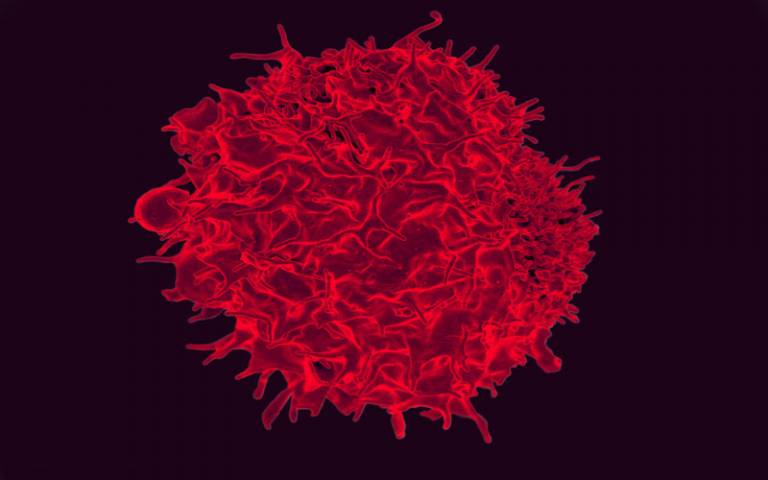'War in the Blood', a film about CAR T-cell therapy
2 July 2019
A new BBC film looks at the work of scientists at UCL and clinicians at UCLH working together on groundbreaking ‘first in-human’ immunotherapy trials.

These clinical trials are testing new treatments which ‘re-programme’ the immune system to recognise and kill cancer cells, providing a more efficient and less toxic way of treating cancer.
Between them, UCLH and UCL are leading the largest portfolio of CAR T cell studies in Europe with underpinning support from the National Institute for Health Research (NIHR) University College London Hospitals (UCLH) Biomedical Research Centre (BRC) and funding by several partners including the blood cancer charity Bloodwise, and the EU 7th Framework Programme.
CAR T-cell therapy directs T-cells to attack cancer cells by harvesting T-cells from blood and genetically engineering them outside the body so they are reprogrammed to kill cancer cells. Once they are infused back to the patient, these CAR T-cells act as miniature robot, and find and destroy cancer cells.
The BBC’s intimate feature length documentary follows two patients through their treatment and the doctors battling to save their lives. Filmed over two years at University College Hospital and UCL, the 100-minute film directed by Arthur Cary is a powerful statement on the contribution of terminally ill patients to the world of clinical research.
Not allowed to meet and separated by two floors of a hospital, 53-year-old Graham and 18-year-old Mahmoud are nevertheless bound together by their commitment to the treatment and their faith in the science. Terminally ill, the trial represents their only option. How do their ages and life experiences affect their physical and emotional response?
For the scientists and clinicians working to develop this treatment, the responsibility of designing and testing new treatments in patients is both exciting and daunting. At the heart of this film is the complex relationship between scientists developing these treatments, the clinical team testing them and the patients receiving the experimental therapies.
The documentary is uncompromising and does not shy away from the experiences of patients with end-stage cancer and the complex motivations behind participating in an experimental clinical study.
CAR T-cell therapy has so far shown most promise for haematological (blood) cancers, and Division of Infection & Immunity researcher, Professor Emma Morris, says the therapy represents “a real step change in how we treat cancers. It represents a leap in medical therapies, from using small chemical molecules or proteins to using cells. The complexity of cells means that they can be engineered in highly ingenious ways, leading to treatments with specificity and activity unimaginable in conventional treatments.”
UCLH is looking forward to opening the Sir Naim Dangoor Centre for Cellular Immunotherapy in 2020. This will be an eight-bed unit at UCLH within a new surgery and cancer building made possible by a generous gift of £1.6 million from the Exilarch’s Foundation, and will build on the world-renowned expertise and ground-breaking advances being made at UCLH to successfully treat cancer using cellular immunotherapy.
War in the Blood, produced by Minnow Films for BBC Two, and directed by Arthur Cary, will air on Sunday 7 July at 9pm.
Links
- Profile: Professor Emma Morris
- 'War in the Blood' (BBC Two website)
Image
- Credit: 'T Lymhocyte' (resized), NIAID via Flickr
Further information
- Source: UCL News
- Media Contact: Henry Killworth, Tel: +44 (0) 207 679 5296
 Close
Close

